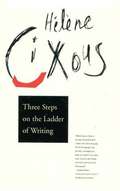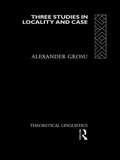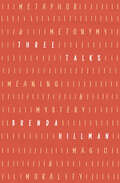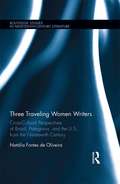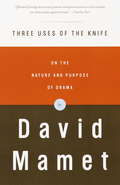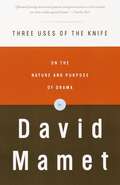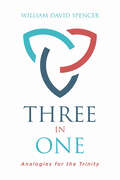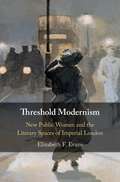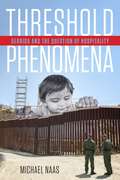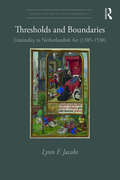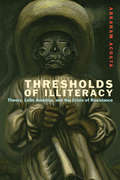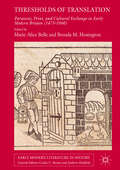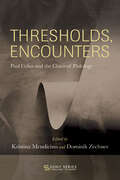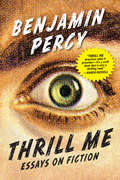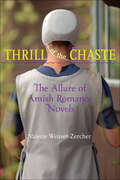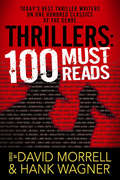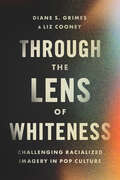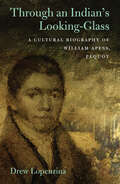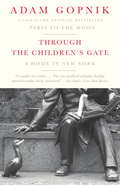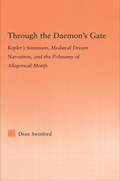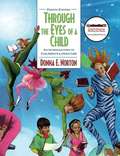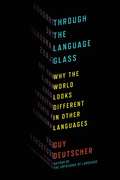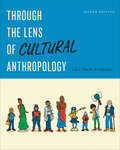- Table View
- List View
Three Steps on the Ladder of Writing
by Susan Sellers Helene Cixous Sarah CornellThree Steps on the Ladder of Writing is a poetic, insightful, and ultimately moving exploration of 'the strange science of writing. ' In a magnetic, irresistible narrative, Cixous reflects on the writing process and explores three distinct areas essential for 'great' writing: The School of the Dead-the notion that something or someone must die in order for good writing to be born; The School of Dreams-the crucial role dreams play in literary inspiration and output; and The School of Roots-the importance of depth in the 'nether realms' in all aspects of writing. Cixous's love of language and passion for the written word is evident on every page.
Three Studies in Locality and Case (Theoretical Linguistics Ser.)
by Alexander GrosuFirst Published in 2004. Routledge is an imprint of Taylor & Francis, an informa company.
Three Talks: Metaphor and Metonymy, Meaning and Mystery, Magic and Morality (Kapnick Foundation Distinguished Writer-in-Residence Lectures)
by Brenda HillmanThree Talks is the first prose collection by the award-winning poet and educator Brenda Hillman. These short essays on six M&’s of the art of poetry make the form accessible in a novel way, exploring words that might appear incompatible but become dancing partners in Hillman&’s artistic vision: metaphor and metonymy; meaning and mystery; magic and morality. First delivered as a series of talks at the University of Virginia, the essays maintain a casual, intimate tone. A consummate artist and technician, Hillman explores a wide array of poetic examples, focusing on method, subject matter, and inspiration to demonstrate how the skills offered by poetry have become critically important for our present moment.
Three Traveling Women Writers: Cross-Cultural Perspectives of Brazil, Patagonia, and the U.S from the Nineteenth Century (Routledge Studies in Nineteenth Century Literature)
by Natália Fontes de OliveiraThis book presents an alternative framework for reading nineteenth century women’s travel narratives by challenging the traditional paradigms which often limit women’s space in print culture. For the first time, through a comparative lens, a Latin American woman’s travel narrative is analyzed concomitantly with the narratives of a North American and a European writer. Contrary to the common assumption that Latin American women were powerless victims of imperialism, elite women had access to the predominant philosophies of their time, traveled around the globe, and wrote about their experiences. This book examines how an Argentinian writer, together with an English and an American writer, manipulate their bourgeois identity to inhabit the male dominated sphere of print culture. By travelling and publishing travel narratives, the three traveling women writers search for empowerment to establish their authority as writers and shapers of knowledge in literature. Utilizing several concepts and criticisms, including Aristotle’s rhetoric, Foucault’s theories, travel writing criticism, postcolonial discourse, and feminist literary criticism; this volume attempts to challenge old-fashioned architypes and confinements of gender for traveling women writers in the nineteenth century.
Three Uses of the Knife
by David MametThe purpose of theater, like magic like religion...ids to inspire cleansing awe. With bracing directness and aphoristic authority, one of our greatest living playwrights addresses the questions: What makes good drama? And why does drama matter in an age that is awash in information and entertainment? David Mamet believes that the tendency to dramatize is essential to human nature, that we create drama out of everything from today's weather to next year's elections. But the highest expression of this drive remains the theater. With a cultural range that encompasses Shakespeare, Bretcht, and Ibsen, Death of a Salesman and Bad Day at Black Rock, Mamet shows us how to distinguish true drama from its false variants. He considers the impossibly difficult progression between one act and the next and the mysterious function of the soliloquy. The result, in Three Uses of the Knife, is an electrifying treatise on the playwright's art that is also a strikingly original work of moral and aesthetic philosophy.
Three Uses of the Knife: On the Nature and Purpose of Drama
by David MametMamet unravels the infamous "Second-Act Problem," considers the mysterious persistence of the soliloquy. Three Uses of the Knife is an inspired guide for any playwright that doubles as a trenchant work of aesthetic philosophy.
Three in One: Analogies for the Trinity
by William David SpencerDo our images of "one God in three persons" reflect God well?Throughout history, Christians have pictured the relationships between Father, Son, and Holy Spirit through analogies. Such illustrations--some from the West but also from Latin America, Asia, Africa, and other places--come laden with theological ramifications that the church has rejected (heresies) or embraced (doctrines). In Three in One, William David Spencer shares a lifetime of insights from teaching within the global church, bringing fresh images and analogies of the Trinity to deepen our theological vocabulary.Drawing from his extensive teaching in geographically and culturally diverse contexts and his artist's passion for evocative words and visuals, Spencer offers readers a rich, multifaceted, and practical exploration of the Trinity. Alongside historical and contemporary theology and biblical studies, he considers the strengths and shortcomings of various analogies used to explain the Trinity, such as:LightWaterThe Celtic knotThe totem poleMusical harmoniesThe human bodyThe familyReaders of Three in One will gain a personal understanding of the Trinity as well as tools for teaching about the Trinity in adult and children's ministry contexts.
Three-Martini Afternoons at the Ritz: The Rebellion of Sylvia Plath & Anne Sexton
by Gail CrowtherA vividly rendered and empathetic exploration of how two of the greatest poets of the 20th century—Sylvia Plath and Anne Sexton—became bitter rivals and, eventually, friends. Introduced at a workshop in Boston University led by the acclaimed and famous poet Robert Lowell, Sylvia Plath and Anne Sexton formed a friendship that would soon evolve into a fierce rivalry, colored by jealousy and respect in equal terms. In the years that followed, these two women would not only become iconic figures in literature, but also lead curiously parallel lives haunted by mental illness, suicide attempts, self-doubt, and difficult personal relationships. With weekly martini meetings at the Ritz to discuss everything from sex to suicide, theirs was a relationship as complex and subversive as their poetry. Based on in-depth research and unprecedented archival access, Three-Martini Afternoons at the Ritz is a remarkable and unforgettable look at two legendary poets and how their work has turned them into lasting and beloved cultural figures.
Threshold Modernism: New Public Women and the Literary Spaces of Imperial London
by Elizabeth F. EvansThreshold Modernism reveals how changing ideas about gender and race in late nineteenth- and early twentieth-century Britain shaped - and were shaped by - London and its literature. Chapters address key sites, especially department stores, women's clubs, and city streets, that co-evolved with controversial types of modern women. Interweaving cultural history, narrative theory, close reading, and spatial analysis, Threshold Modernism considers canonical figures such as George Gissing, Henry James, Dorothy Richardson, H. G. Wells, and Virginia Woolf alongside understudied British and colonial writers, including Amy Levy, B. M. Malabari, A. B. C. Merriman-Labor, Duse Mohamed Ali, and Una Marson. Evans argues that these diverse authors employed the 'new public women' and their associated spaces to grapple with widespread cultural change and reflect on the struggle to describe new subjects, experiences, and ways of seeing in appropriately novel ways. For colonial writers of color, those women and spaces provided a means through which to claim their own places in imperial London.
Threshold Phenomena: Derrida and the Question of Hospitality
by Michael NaasThreshold Phenomena reexamines Jacques Derrida’s thinking of hospitality, from his well-known writings of the 1990s to his recently-published seminars on the same topic. The book follows Derrida’s rereading of several central figures and texts on hospitality (Sophocles’ Oedipus at Colonus, Kant’s Perpetual Peace, Levinas’s Totality and Infinity) and his attempt to rethink questions surrounding not only private but also public hospitality in the form of immigration law, the contemporary treatment of migrants or stateless peoples, and the establishment of cities of asylum.Naas develops many of the central themes of Derrida’s seminar—the relationship between hospitality and teletechnology (telephone, internet, cyberspace, etc.), the role of fatherlands and mother tongues in hospitality, questions of purity, immunity, and xenophobia, and the possibility of extending hospitality beyond the human—to animals, plants, gods, and clones. Reframing Derrida’s approach to ethics, Naas reconsiders the relationship between hospitality and deconstruction, concluding that hospitality is not merely a theme to be treated by deconstruction but one of the best ways of describing its work. Naas’s book turns around a figure that Derrida himself returns to several times throughout the seminar: the threshold—a figure of hospitality par excellence, but also, in his seminars, another name for what Derrida in the 1960s began calling différance. Threshold Phenomena concludes that Derrida’s seminar on hospitality is one of the best introductions we have to Derrida’s work in general and one of the surest signs of its continuing relevance, a seminar that is at once fascinating and engaging in its own right and necessary for analyzing today’s increasingly nationalistic and xenophobic political climate.
Thresholds and Boundaries: Liminality in Netherlandish Art (1385-1530) (Visual Culture in Early Modernity)
by Lynn F. JacobsAlthough liminality has been studied by scholars of medieval and seventeenth-century art, the role of the threshold motif in Netherlandish art of the late fourteenth, fifteenth and early sixteenth centuries -- this late medieval/early ‘early modern’ period -- has been much less fully investigated. Thresholds and Boundaries: Liminality in Netherlandish Art (1385-1550) addresses this issue through a focus on key case studies (Sluter's portal of the Chartreuse de Champmol and the calendar pages of the Limbourg Brothers' Très Riches Heures), and on important formats (altarpieces and illuminated manuscripts). Lynn F. Jacobs examines how the visual thresholds established within Netherlandish paintings, sculptures, and manuscript illuminations become sites where artists could address relations between life and death, aristocrat and peasant, holy and profane, and man and God—and where artists could exploit the "betwixt and between" nature of the threshold to communicate, paradoxically, both connections and divisions between these different states and different worlds. Building on literary and anthropological interpretations of liminality, this book demonstrates how the exploration of boundaries in Netherlandish art infused the works with greater meaning. The book's probing of the -- often ignored --meanings of the threshold motif casts new light on key works of Netherlandish art.
Thresholds of Illiteracy: Theory, Latin America, and the Crisis of Resistance (Just Ideas)
by Abraham AcostaThresholds of Illiteracy reevaluates Latin American theories and narratives of cultural resistance by advancing the concept of “illiteracy” as a new critical approach to understanding scenes or moments of social antagonism. “Illiteracy,” Acosta claims, can offer us a way of talking about what cannot be subsumed within prevailing modes of reading, such as the opposition between writing and orality, that have frequently been deployed to distinguish between modern and archaic peoples and societies.This book is organized as a series of literary and cultural analyses of internationally recognized postcolonial narratives. It tackles a series of the most important political/aesthetic issues in Latin America that have arisen over the past thirty years or so, including indigenism, testimonio, the Zapatista movement in Chiapas, and migration to the United States via the U.S.–Mexican border.Through a critical examination of the “illiterate” effects and contradictions at work in these resistant narratives, the book goes beyond current theories of culture and politics to reveal radically unpredictable forms of antagonism that advance the possibility for an ever more democratic model of cultural analysis.
Thresholds of Translation: Paratexts, Print, and Cultural Exchange in Early Modern Britain (1473-1660) (Early Modern Literature in History)
by Marie-Alice Belle Brenda M. HosingtonThis volume revisits Genette’s definition of the printed book’s liminal devices, or paratexts, as ‘thresholds of interpretation’ by focussing specifically on translations produced in Britain in the early age of print (1473-1660). At a time when translation played a major role in shaping English and Scottish literary culture, paratexts afforded translators and their printers a privileged space in which to advertise their activities, display their social and ideological affiliations, influence literary tastes, and fashion Britain’s representations of the cultural ‘other’.Written by an international team of scholars of translation and material culture, the ten essays in the volume examine the various material shapes, textual forms, and cultural uses of paratexts as markers (and makers) of cultural exchange in early modern Britain. The collection will be of interest to scholars of early modern translation, print, and literary culture, and, more broadly, to those studying the material and cultural aspects of text production and circulation in early modern Europe.
Thresholds, Encounters: Paul Celan and the Claim of Philology (SUNY series, Literature . . . in Theory)
by Kristina Mendicino; Dominik ZechnerPaul Celan's works dwell on the threshold between the extremes of poetic expression and philosophical reflection. The divergent literary and critical idioms that have marked Celan's writing—and that Celan's writing has come to mark for others (Hamacher, Derrida, Szondi)—thus call for a new philology. This philology cannot be situated within presupposed genres or fields but rather explores the ways in which poetic and philosophical ambitions meet in texts by, and on, Celan. The first part of Thresholds, Encounters ("Ex-posing the Poem") speaks to issues of history, ecology, and aurality; the second part ("Language Dislodged") delves into Celan's articulations of encounter, positionality, and translation. Throughout, contributors probe the consequences of Celan's poetry for thinking and writing, while inviting readers from different disciplinary spaces to further pace out the liminal zones opened by his oeuvre.
Thrill Me: Essays on Fiction
by Benjamin PercyBold new essays on how to craft a thrilling read--in any genre--from the bestselling author of The Dead LandsAnyone familiar with the meteoric rise of Benjamin Percy's career will surely have noticed a certain shift: After writing two short-story collections and a literary novel, he delivered the werewolf thriller Red Moon and the postapocalyptic epic The Dead Lands. Now, in his first book of nonfiction, Percy challenges the notion that literary and genre fiction are somehow mutually exclusive. The title essay is an ode to the kinds of books that make many readers fall in love with fiction: science fiction, fantasy, mysteries, horror, from J.R.R. Tolkien to Anne Rice, Ursula K. Le Guin to Stephen King. Percy's own academic experience banished many of these writers in the name of what is "literary" and what is "genre." Then he discovered Michael Chabon, Aimee Bender, Cormac McCarthy, Margaret Atwood, and others who employ techniques of genre fiction while remaining literary writers. In fifteen essays on the craft of fiction, Percy looks to disparate sources such as Jaws, Blood Meridian, and The Girl with the Dragon Tattoo to discover how contemporary writers engage issues of plot, suspense, momentum, and the speculative, as well as character, setting, and dialogue. An urgent and entertaining missive on craft, Thrill Me brims with Percy's distinctive blend of anecdotes, advice, and close reading, all in the service of one dictum: Thrill the reader.
Thrill of the Chaste: The Allure of Amish Romance Novels (Young Center Books in Anabaptist and Pietist Studies)
by Valerie Weaver-ZercherTake a peek beneath the bonnet.Browse the inspirational fiction section of your local bookstore, and you will likely find cover after cover depicting virtuous young women cloaked in modest dresses and wearing a pensive or playful expression. They hover innocently above sun-drenched pastures or rustic country lanes, often with a horse-drawn buggy in the background—or the occasional brawny stranger. Romance novels with Amish protagonists, such as the best-selling trailblazer The Shunning by Beverly Lewis, are becoming increasingly popular with a largely evangelical female audience. Thrill of the Chaste is the first book to analyze this growing trend in romance fiction and to place it into the context of contemporary literature, religion, and popular culture.Valerie Weaver-Zercher combines research and interviews with devoted readers, publishers, and authors to produce a lively and provocative examination of the Amish romance novel. She discusses strategies that literary agents and booksellers use to drive the genre’s popularity. By asking questions about authenticity, cultural appropriation, and commodification, Thrill of the Chaste also considers Amish fiction’s effects on Amish and non-Amish audiences alike.
Thrillers: 100 Must-Reads
by David Morrell Hank WagnerThe most riveting reads in history meet today's biggest thriller writers in Thrillers: 100 Must-Reads.Edited by David Morrell and Hank Wagner, Thrillers: 100 Must-Reads examines 100 seminal works of suspense through essays contributed by such esteemed modern thriller writers as: David Baldacci, Steve Berry, Sandra Brown, Lee Child, Jeffery Deaver, Tess Gerritsen, Heather Graham, John Lescroart, Gayle Lynds, Katherine Neville, Michael Palmer, James Rollins, R. L. Stine, and many more.Thrillers: 100 Must-Reads features 100 works - from Beowulf to The Bourne Identity, Dracula to Deliverance, Heart of Darkness to The Hunt for Red October - deemed must-reads by the International Thriller Writers organization.Much more than an anthology, Thrillers: 100 Must-Reads goes deep inside the most notable thrillers published over the centuries. Through lively, spirited, and thoughtful essays that examine each work's significance, impact, and influence, Thrillers: 100 Must-Reads provides both historical and personal perspective on those spellbinding works that have kept readers on the edge of their seats for centuries.
Through A Classical Eye
by Andrew Galloway R. F. YeagerAs students and scholars of Boccaccio, Chaucer, and Dante know, late medieval writers were influenced greatly by the work of peers that crossed historical, national, cultural, linguistic boundaries. Through a Classical Eye contains first-rate essays that demonstrate a range of strategies for undertaking transcultural and transhistorical studies of the late medieval period, and examines medieval literature and culture where English, Italian, and Latin materials overlap. Written in honour of the groundbreaking contributions that Winthrop Wetherbee made to this growing area of study, the volume's contributors advance his legacy and add to the burgeoning interest in setting medieval literary studies into wide intellectual and historical horizons. Divided into three illuminating sections on Medieval Latin authorship, Italy and the world, and England and beyond, and including a personal reminiscence of Wetherbee by the noted novelist Robert Morgan, Through a Classical Eye is an outstanding collection that provides key insights into medieval literature and culture.
Through The Lens Of Whiteness: Challenging Racialized Imagery In Pop Culture
by Diane S. Grimes Liz CooneyThrough an Indian's Looking-Glass: A Cultural Biography of William Apess, Pequot (Native Americans of the Northeast)
by Drew LopenzinaThis biography of the Native American writer, activist, and minister &“brings Apess nearly fully to life, which no one else, among many scholars, has.&” (Barry O&’Connell, editor of On Our Own Ground: The Complete Writings of William Apess, a Pequot) The life of William Apess (1798–1839), a Pequot Indian, Methodist preacher, and widely celebrated writer, provides a lens through which to comprehend the complex dynamics of indigenous survival and resistance in the era of America&’s early nationhood. Apess&’s life intersects with multiple aspects of indigenous identity and existence in this period, including indentured servitude, slavery, service in the armed forces, syncretic engagements with Christian spirituality, and Native struggles for political and cultural autonomy. Even more, Apess offers a powerful and provocative voice for the persistence of Native presence in a time and place that was long supposed to have settled its &“Indian question&” in favor of extinction. Through meticulous archival research, close readings of Apess&’s key works, and informed and imaginative speculation about his largely enigmatic life, Drew Lopenzina provides a vivid portrait of this singular Native American figure. This new biography will sit alongside Apess&’s own writing as vital reading for those interested in early American history and indigeneity.
Through the Children's Gate: A Home in New York
by Adam GopnikFollowing the best-selling Paris to the Moon,the continuation of the Gopniks' adventures against the panorama of a different though no less storied city as they attempt to make a new home for themselves. Autumn 2000: After five years in Paris, Adam Gopnik moves his family back to a New York that seems, at first, safer and shinier than ever. Here in the wondrously strange "neighborhood" of Manhattan we observe the triumphs and travails of father, mother, son, and daughter; and of the teachers, coaches, therapists, adversaries, and friends who round out the extended urban family. From Bluie, a goldfish fated to meet a Hitchcockian end, to Charlie Ravioli, an imaginary playmate who, being a New Yorker, is too busy to play, the Gopniks' new home is under the spell of the sort of characters only the city's unique civilization of childhood could produce. Not long after their return, the fabric of living will be rent by the events of 9/11, but like a magic garment will reweave itself, reviving normalcy in a world where Jewish jokes mingle with debates about the problem of consciousness, the price of real estate, and the meaning of modern art. Along the way, the impermanence and transcendence of life will be embodied in the person of a beloved teacher and coach who, even facing death, radiates a distinctively local light. Written with Gopnik's signature mix of mind and heart, elegant and exultantly alert to the minute miracles that bring a place to life, Through the Children's Gate is a chronicle, by turns tender and hilarious, of a family taking root in the unlikeliest patch of earth.
Through the Daemon's Gate: Kepler's Somnium, Medieval Dream Narratives, and the Polysemy of Allegorical Motifs (Studies in Medieval History and Culture)
by Dean SwinfordThis book tells the story of the early modern astronomer Johannes Kepler’s Somnium, which has been regarded by science historians and literary critics alike as the first true example of science fiction. Kepler began writing his complex and heavily-footnoted tale of a fictional Icelandic astronomer as an undergraduate and added to it throughout his life. The Somnium fuses supernatural and scientific models of the cosmos through a satirical defense of Copernicanism that features witches, lunar inhabitants, and a daemon who speaks in the empirical language of modern science. Swinford’s looks at the ways that Kepler’s Somnium is influenced by the cosmic dream, a literary genre that enjoyed considerable popularity among medieval authors, including Geoffrey Chaucer, Dante, John of Salisbury, Macrobius, and Alan of Lille. He examines the generic conventions of the cosmic dream, also studying the poetic and theological sensibilities underlying the categories of dreams formulated by Macrobius and Artemidorus that were widely used to interpret specific symbols in dreams and to assess their overall reliability. Swinford develops a key claim about the form of the Somnium as it relates to early science: Kepler relies on a genre that is closely connected to a Ptolemaic, or earth-centered, model of the cosmos as a way of explaining and justifying a model of the cosmos that does not posit the same connections between the individual and the divine that are so important for the Ptolemaic model. In effect, Kepler uses the cosmic dream to describe a universe that cannot lay claim to the same correspondences between an individual’s dream and the order of the cosmos understood within the rules of the genre itself. To that end, Kepler’s Somnium is the first example of science fiction, but the last example of Neoplatonic allegory.
Through the Eyes of a Child: An Introduction to Children's Literature
by Donna E. Norton Saundra NortonNo text better prepares you for evaluating, choosing, and sharing quality children's literature thanThrough the Eyes of a Child: An Introduction to Children's Literature. This streamlined eighth edition continues to provide a visually stunning, theoretically sound, comprehensive overview of children's literature. Sharpened focus on contemporary issues in the field, deepened coverage of biography and informational books, and newly integrated technology give this new edition added relevance in the changing field. In addition to the text's contemporary and valuable information on literature for younger readers, some of the brightest stars of children's literature lend their talents to the new edition, providing insight into the craft and addressing the changing needs of middle grades readers.
Through the Language Glass: Why The World Looks Different in Other Languages
by Guy DeutscherA masterpiece of linguistics scholarship, at once erudite and entertaining, confronts the thorny question of how - and whether - culture shapes language and language, culture. Linguistics has long shied away from claiming any link between a language and the culture of its speakers: too much simplistic (even bigoted) chatter about the romance of Italian and the goose-stepping orderliness of German has made serious thinkers wary of the entire subject. But now, acclaimed linguist Guy Deutscher has dared to reopen the issue. Can culture influence language - and vice versa? Can different languages lead their speakers to different thoughts? Could our experience of the world depend on whether our language has a word for "blue"? Challenging the consensus that the fundaments of language are hard-wired in our genes and thus universal, Deutscher argues that the answer to all these questions is - yes. In thrilling fashion, he takes us from Homer to Darwin, from Yale to the Amazon, from how to name the rainbow to why Russian water - a "she"& - becomes a "he" once you dip a tea bag into her, demonstrating that language does in fact reflect culture in ways that are anything but trivial. Audacious, delightful, and field-changing,Through the Language Glass is a classic of intellectual discovery.
Through the Lens of Cultural Anthropology: Second Edition
by Laura Tubelle GonzálezThrough the Lens of Cultural Anthropology presents an introduction to cultural anthropology designed to engage students who are learning about the anthropological perspective for the first time. The book offers a sustained focus on language, food, and sustainability in an inclusive format that is sensitive to issues of gender, sexuality, race, and ethnicity. Integrating personal stories from her own fieldwork, Laura Tubelle de González brings her passion for transformative learning to students in a way that is both timely and thought-provoking. The second edition has been revised and updated throughout to reflect recent developments in the field. It includes further discussion of globalization, an expanded focus on Indigenous peoples in the United States and Canada, revised discussion of sexuality and gender identities across the globe, a brief introduction to the anthropology of science, and updated box features and additional discussion questions that focus on applying concepts. Beautifully illustrated with over sixty full-color images, including comics and maps, Through the Lens of Cultural Anthropology brings concepts to life in a way that resonates with student readers. The second edition is supplemented by a full suite of updated instructor and student resources. For more information, go to lensofculturalanthropology.com.
